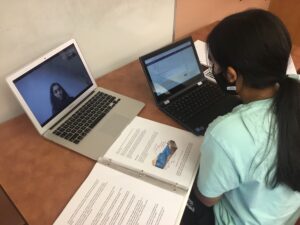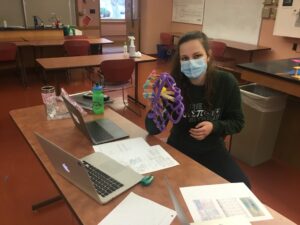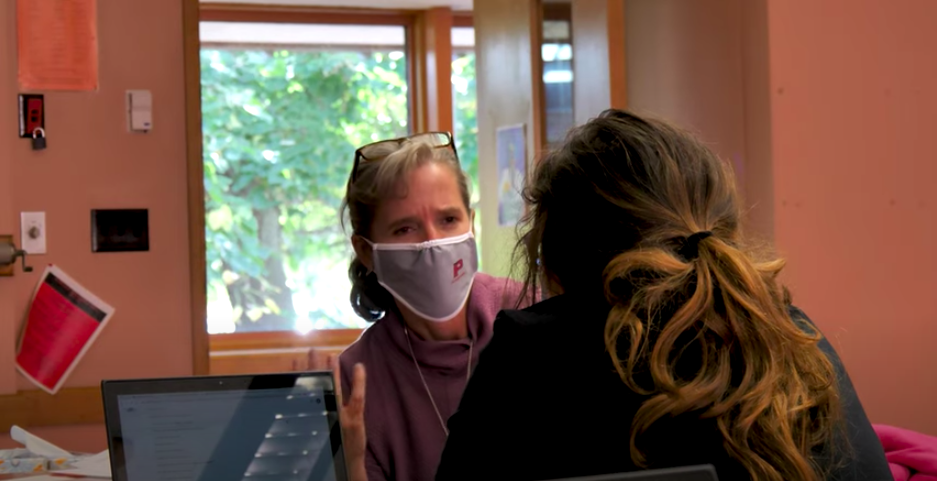To kick off the 12 Days of Giving, we introduce you to Jean Weaver, a Science teacher who has made her subject the talk of Prairie's Upper School.
“The people make Prairie, Prairie.”
It’s one of Dr. Coffman’s favorite sayings. And during a semester that looks much different than in years past, never has this been more apparent.
This has always been a school focused on building relationships. From mentors impacting mentees, to colleagues learning from one another, to big and little buddies bonding across divisions, ours is a school committed to knowing, valuing, supporting and challenging each other.
To kick off the 12 Days of Giving, we introduce you to a few more People of Prairie, and look forward to sharing some of the relationships that help define our community. You can support this year’s 12 Days of Giving campaign and help grow inspiration and creativity all across campus with a gift to the Prairie Fund.
________
“Everyone is a nerd about something.”
So says Jean Weaver, quite possibly the coolest “nerd” you will ever meet. Not only is Dr. Weaver an incredibly studied expert in her field — science, specifically Chemistry — she is unwaveringly passionate about getting her students excited about the subject, too. 
In addition to chairing Prairie’s Science Department and teaching the highest-level courses offered at Prairie, Dr. Weaver heads what is unquestionably the most popular co-curricular activity in the Upper School: Science Olympiad. She started the program 15 years ago, after hearing about the national program from some fellow faculty members, and quickly grew to love the way it morphed even her quietest students into fierce competitors.
“I have wondered, why do I like this so much? I’m not a competitor, I’m just organizing!” Weaver chuckles. “I really like seeing kids get excited about learning about science, doing it from their own ambition, not because there’s a grade riding on it. I like seeing another avenue for kids to thrive in — if you’re not an athlete, a musician or a stage person, this is something for you.”
Science Olympiad is based around competition, the chance for participants to put their newfound knowledge to the test. When the pandemic hit last spring, it put an end to the 2019-20 season and threatened future contests. In a true spirit of collaboration, Dr. Weaver joined a few fellow Wisconsin-area coaches to figure out what could be done.
They presented their ideas to the National Science Olympiad Committee, and voilá: a new kind of Olympiad was born. This fall, students are participating in “Satellite” Olympiads, wherein students show up to their own school sites, link into a “command central” type Zoom meeting along with their competitors, and compete live in their events via that link.
 In November, Prairie competed in its first satellite meet along with 28 other teams from across the country — including rivals from Marquette High School, and teams from schools as far away as Pennsylvania, California, and North Dakota. Between its two teams (JV and Varsity), Prairie competed in 22 of the 28 events — finishing in 8th place overall, and 3rd place in the Small School category. Hawks outright won four events, in addition to nabbing 10 second place and four third place finishes.
In November, Prairie competed in its first satellite meet along with 28 other teams from across the country — including rivals from Marquette High School, and teams from schools as far away as Pennsylvania, California, and North Dakota. Between its two teams (JV and Varsity), Prairie competed in 22 of the 28 events — finishing in 8th place overall, and 3rd place in the Small School category. Hawks outright won four events, in addition to nabbing 10 second place and four third place finishes.
“We don’t usually compete against schools from that far away, but now you can go anywhere!” Weaver explains.
These new meets simulate much of the same experience for students. For Dr. Weaver, it means a lot more work on the front end, finding and preparing specific materials for different events, organizing logistics (will students need calculators? If so, what kind? Do they need goggles? How many?), and taking photos and videos during certain challenges to submit for virtual judging.
But Dr. Weaver is nothing short of devoted to her students’ academic pursuits. The way her face lights up when she talks about watching her team’s first meet, you’d think she had participated and won a medal herself.
“This allowed them to be back together, doing something fun,” she says. “A lot of people don’t think taking a test would be fun, but these kids are intellectuals. It’s this kind of hard work that brings them all together in the first place. They know they’re going to fail, but it’s safe to fail because they’re failing with their friends. And, the winner is the team that fails the least.”
Failing with your friends. Testing hypotheses, and retesting them if they don’t work. Learning and growing together. Spoken like a true scientist.
